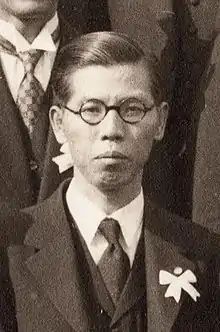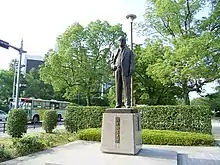Hirokichi Nadao
Hirokichi Nadao (Japanese: 灘尾 弘吉; 21 December 1899 – 22 January 1994) was a Japanese politician. Throughout his career, he served as Minister of Education multiple times, Speaker of the House of Representatives, Minister of Health and Welfare, and Governor of Oita Prefecture.
Hirokichi Nadao | |
|---|---|
灘尾 弘吉 | |
 | |
| Speaker of the House of Representatives | |
| In office 1 February 1979 – 19 May 1980 | |
| Monarch | Hirohito |
| Preceded by | Shigeru Hori |
| Succeeded by | Hajime Fukuda |
| 90th Minister of Education | |
| In office 25 November 1967 – 30 November 1968 | |
| Cabinet | Eisaku Satō II First Reformed Cabinet |
| Preceded by | Toshihiro Kennoki |
| Succeeded by | Michita Sakata |
| 82nd-83rd Minister of Education | |
| In office 18 July 1962 – 18 July 1964 | |
| Cabinet | Hayato Ikeda II Second Reformed Cabinet Hayato Ikeda II Third Reformed Cabinet Hayato Ikeda III |
| Preceded by | Masuo Araki |
| Succeeded by | Kiichi Aichi |
| 37th Minister of Health and Welfare | |
| In office 18 July 1961 – 18 July 1962 | |
| Cabinet | Hayato Ikeda II First Reformed Cabinet |
| Preceded by | Yoshimi Furui |
| Succeeded by | Eiichi Nishimura |
| 77th Minister of Education | |
| In office 12 June 1958 – 31 December 1958 | |
| Preceded by | Tou Matsunaga |
| Succeeded by | Ryogo Hashimoto |
| 74th/75th Minister of Education | |
| In office 23 December 1956 – 10 July 1957 | |
| Preceded by | Ichirō Kiyose |
| Succeeded by | Tou Matsunaga |
| 33rd Governor of Oita Prefecture | |
| In office 7 January 1941 – 15 June 1942 | |
| Member of the House of Representatives | |
| In office 2 October 1952 – 27 November 1983 | |
| Constituency | Hiroshima 1st District |
| Personal details | |
| Born | 21 December 1899 Ōgaki, Hiroshima Prefecture, Japan |
| Died | 22 January 1994 (94 years old) Setagaya, Tokyo, Japan |
| Political party | Liberal Liberal Democratic Independent |
| Alma mater | Tokyo Imperial University |
| Awards | Junior Second Rank Order of the Rising Sun, 1st Class (Order of the Paulownia Flowers) |
Nadao was known for his hawkish attitudes. He held an aggressive stance towards Nikkyoso, the teachers' union of Japan, and unions in general (represented by Sōhyō). He was also one of the main people behind Prime Minister Eisaku Satō's foreign policy. In the mid-1970s, he was regarded as one of the most powerful men in Japan.
Career

Nadao was born in Hiroshima Prefecture in 1899. He graduated with a degree in jurisprudence from Tokyo Imperial University and joined the Home Ministry, rising to the position of Vice Minister[1] pre-war.[2] During the war, he served as Governor of Oita Prefecture.[3]
After the war, Nadao became one of the main people who pushed through the 1954 Police Law (as Minister of Health and Welfare at the time).[4] He was also a member of the "Taiwan faction" of Japanese politics, influencing the foreign policy of Prime Minister Eisaku Satō. He served as the chairman of the Diet Members' Talkfest on Japan-China Relations, visiting Taipei with a delegation to meet with Chiang Kai-Shek in 1959 (the first time any Japanese politician had done so since the cutting of ties with Taipei).[5] In March 1973, Nadao created the LDP Members' Talkfest on Japan-China Relations.[6]
As Education Minister, Nadao was one of the chairmen of the Education System Research Council.[7] Under the premiership of Prime Minister Nobusuke Kishi, Nadao was hawkish towards the teacher's union, Nikkyoso, and the general council for trade unions, Sōhyō, arguing that teachers should not argue for better wages because they should teach based on their conviction and duty to their noble profession.[8] His stand against Nikkyoso was what he was known for within the Ministry of Education, and lumped him in with other members of the "education-public peace" or "law and order" clique,[7] or Bunkyo-chian zoku.[4]
Nadao was also responsible for policies pushing national identity through education. In 1968, he voiced his support for teaching children about the Emperor of Japan, his descent from the sun goddess Amaterasu, and the formation of the Japanese monarchy.[9] He also called for an reevaluation of the 6-3-3-4 system (6 years of primary school, 3 years of junior secondary school, 3 years of senior secondary school, and 4 years of university).[10]
After having served as Minister of Education multiple times, Nadao became a main member of the Education Committee of the LDP.[2] In 1976, Nadao was named as one of the most powerful men in Japanese politics.[11]
References
Citations
- Consulate-General of Japan, Chicago 1955, p. 9.
- Anderson 1975, p. 263.
- Consulate-General of Japan, Chicago 1961, p. 2.
- Garson 1984, p. 452.
- Hsiao 1974, p. 723.
- Wei 2012, p. 82.
- Schoppa 2002, p. 79.
- Schoppa 2002, p. 62.
- Armstrong 1976, p. 283.
- Park 1982, p. 326.
- Johnson 1976, p. 31.
Bibliography
Books
- Anderson, Ronald Stone (1975). Education in Japan: a century of modern development. U.S. Department of Health, Education, and Welfare, Office of Education.
- Schoppa, Leonard James (11 March 2002). Education Reform in Japan: A Case of Immobilist Politics. Routledge. ISBN 978-1-134-86516-1.
- Wei, C. X. George (2012). China-Taiwan Relations in a Global Context: Taiwan's Foreign Policy and Relations. Routledge. ISBN 978-0-415-60012-5.
Journals
- Armstrong, David G. (July 1976). "Educational Change and the Cultural Milieu: Misadventures in Post-War Japan and Their Implications for American Curriculum Workers". Peabody Journal of Education. 53 (4): 278–284. Retrieved 14 May 2021.
- Consulate-General of Japan, Chicago (1955). Japan Report. Japan Information Center, Consulate General of Japan.
- Consulate-General of Japan, Chicago (1961). Japan Report. Japan Information Center, Consulate General of Japan.
- Hsiao, Gene T. (December 1974). "Prospects for a New Sino-Japanese Relationship". The China Quarterly. 60: 720–749. Retrieved 14 May 2021.
- Johnson, Chalmers (January 1976). "Japan 1975: Mr. Clean Muddles Through". Asian Survey. 16 (1): 31–41. Retrieved 14 May 2021.
- Garson, Sheldon M. (May 1984). "The Imperial Bureaucracy and Labor Policy in Postwar Japan". The Journal of Asian Studies. 43 (3): 441–457. Retrieved 14 May 2021.
- Park, Yung H. (March 1982). ""Big Business" and Education Policy in Japan". Asian Survey. 22 (3): 315–336. Retrieved 14 May 2021.